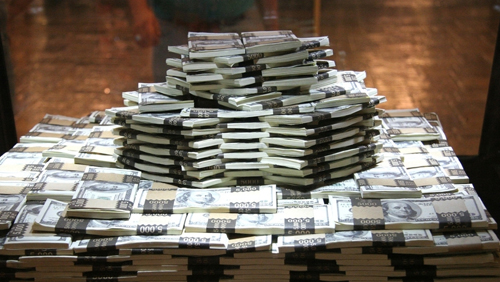The 2015 Dota 2 International created an $18 million prize pool, mainly through in-game add-on purchases, the Halo 5 World Championships plan to do the same. How could poker get in on the act?
 This summer, eSports team Evil Geniuses won Valve’s premier eSports tournament: Dota 2 The International. Two things caught my eye about this victory: the size of the prize pool and its construction.
This summer, eSports team Evil Geniuses won Valve’s premier eSports tournament: Dota 2 The International. Two things caught my eye about this victory: the size of the prize pool and its construction.
The total prize pool exceeded $18 million. That’s double the prize pool of the Season 12 European Poker Tour (EPT) Main Event in Barcelona. John Juanda earned $1.1m for that win and the 1,694 players that entered created that prize pool in its entirety. Evil Geniuses won $6.6m at the Dota 2 champs.
Tournament organisers Valve only contributed $1.6m towards the prize pool. The rest of the money ($17m+) came from the players in the form of special in-game bonus packs that they bought throughout the year. The prize pool could have been even larger than $18m when you consider of those in-game packs only 25% of the money collected went towards the prize pool, with 75% filling Valve’s already bustling coffers.
In the coming week’s Microsoft and 343 Industries Halo franchise will embark on its first-ever World Championships. The prize pool currently stands at $2m, and it’s still rising. Microsoft has stumped up $1m, and the rest of the prize money comes from the sale of in-game packs known as REQ (requisition) Packs.
My son used to be a FIFA 14 nut before Fallout 4 dropped on his lap. The FIFA franchise created Ultimate Team. A new derivative where player’s squads improved through the sale of in-game packs. I know. I have handed over several hundred pounds to my son to purchase them.
Pack purchasing has become a game within a game. It all boils down to the excitement you used to feel when walking around the school yard with your Panini football sticker swaps bulging from that elastic band. People filming themselves opening packs attract hundreds of thousands of views on YouTube. The video gaming marketers have cottoned on to something quite remarkable.
So how could poker benefit?
Could online poker be improved with the introduction of in-house packs?
Let’s take PokerStars as an example.
They could create a library of video and audio content from their Team Pros and Team SportStars and allow access to the vaults via the in-game card system. They could create a bad beat jackpot similar to the one on Full Tilt and give away spins. They could give away satellite seats and buy-ins. PokerStars merchandise, unique avatars and poker equipment such as decks of cards, dealer buttons, etc. EPT regulars could win free massages, free food, free accommodation and airfare commissions.
I know Heads Up Displays (HUD) are being phased out, but what if they weren’t? What if instead of phasing them out they become an integral part of the game, but tightly controlled?
What if the HUD was the poker player’s primary weapon system? You purchase a card, and in that pack you win the Pre Flop Raising Statistic? The more in-games cards you buy, the stronger your HUD becomes.
The money that Stars would obtain from the in-game purchases could be used to create larger prize pools both live and online while simultaneously reducing the size of the buy-in. The EPT above at Barcelona had 1,694 players at a buy-in rate of €5,300. Now reduce buy-in by 50% and double the prize pool – how many players would they get?
I also believe there is scope for this type of idea to work within the Global Poker League (GPL). Alex Dreyfus is attempting to make the game more professional, and this means removing the requirement for the players to supply the buy-in. I know, Alex doesn’t own an online poker room but is it beyond the realm of possibility for him to one day do so, and to turn that online poker room into a hybrid between poker and video games that include a revenue generating in-game card system?
There is a germ of an idea here.
What are your thoughts?
Could it work?